Rep.-elect Jeff Crank (R-CO) is excited about the future of space—especially, what he can do as a freshman lawmaker to help the commercial space community keep growing.
“We talk about it being a frontier, and it truly is,” he told Payload. “I love the fact that over the past decade, we’ve moved toward more of a free market for space launch. We’ve got competing interests. I think the whole market is starting to mature a little bit, and we’ll see how the government can help continue that growth and maturity.”
Next year, Crank will represent Colorado Springs in the US House, taking the seat of retiring Rep. Doug Lamborn (R-CO), who was a vocal supporter of the national security space enterprise and served as chairman of the House Armed Services space subcommittee.
Ahead of his arrival in DC, he chatted with Payload about his top to-dos, the fight to keep US Space Command in his district, and whether he’d go to space if given the opportunity.
Top priorities: Crank laid out some of his top national security space priorities for his freshman term, including:
- Boosting overall defense spending
- Picking up Lamborn’s past work on missile defense and hypersonics
- Cutting the regulatory burden for commercial space
How much of an impact he can make depends on his committee assignments. Crank said he’s asked to serve on the House Armed Services Committee, but it will ultimately be up to the steering committee, where seniority rules.
The black bear in the room: Crank said he is working to figure out what the new administration will decide when it comes to the location of US Space Command HQ, which ended up in Colorado Springs after a drawn-out battle with the Alabama delegation. There’s some speculation that incoming President-elect Donald Trump will move the HQ to Huntsville—his original pick during his first term.
“The American people elected President Trump because they want a strong national defense, and part of that is the readiness aspect of Space Command,” he said. “It’s a fully operational command here. It makes sense to have it in Colorado Springs.”
Colorful Colorado: Crank also talked about how to ensure Colorado remains a strong space state, as other states—from Maine to Texas—try to attract a larger piece of the growing space economy.
“We can’t let our guard down. We need to work with the governor and legislature to keep a good business climate here, so taxes remain reasonable and quality of life remains good,” he said. “But the growth in Colorado Springs over the last decade has been tremendous.”
Go boldly: Would Crank love to become the next statesman-turned-astronaut? Absolutely—though he said his wife might not be a fan of him blasting off.
“I’m an adventurer at heart,” he said.





